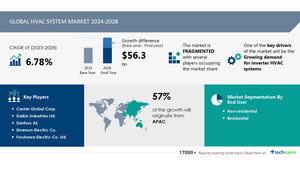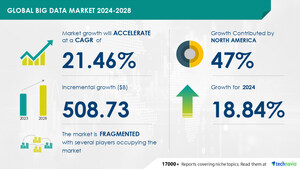NEW YORK, Oct. 29, 2024 /PRNewswire/ -- Report on how AI is redefining market landscape - The global modular construction market in healthcare sector size is estimated to grow by USD 10.86 billion from 2024-2028, according to Technavio. The market is estimated to grow at a CAGR of 16.4% during the forecast period. Increase in demand for customizable healthcare construction is driving market growth, with a trend towards rise in usage of modular construction in healthcare sector post covid-19 pandemic. However, construction issues related to standardization in healthcare sector poses a challenge.Key market players include Black Diamond Group Ltd., BMarko Structures LLC, Commercial Structures Corp., Cotaplan, Elite Systems GB Ltd., EPACK Polymers Pvt Ltd., Fero International Inc, MCC Group London, Midlands Portable Buildings, Modulaire Group, Modular Genius, Modulus Housing, MTX Contracts Ltd., POL R Enterprises Inc., Premier Modular Group, Pressmach Infrastructure Pvt Ltd., Ramtech Building Systems Inc., Red Sea International Co., Rheinmetall AG, Triumph Modular Inc., Vanguard Healthcare Solutions, and Wilmot Modular Structures Inc..
Key insights into market evolution with AI-powered analysis. Explore trends, segmentation, and growth drivers- View the snapshot of this report
Modular Construction Market In Healthcare Sector Scope |
|
Report Coverage |
Details |
Base year |
2023 |
Historic period |
2018 - 2022 |
Forecast period |
2024-2028 |
Growth momentum & CAGR |
Accelerate at a CAGR of 16.4% |
Market growth 2024-2028 |
USD 10858.7 million |
Market structure |
Fragmented |
YoY growth 2022-2023 (%) |
15.1 |
Regional analysis |
North America, Europe, Asia, and Rest of World (ROW) |
Performing market contribution |
North America at 32% |
Key countries |
US, China, Japan, and Germany |
Key companies profiled |
Black Diamond Group Ltd., BMarko Structures LLC, Commercial Structures Corp., Cotaplan, Elite Systems GB Ltd., EPACK Polymers Pvt Ltd., Fero International Inc, MCC Group London, Midlands Portable Buildings, Modulaire Group, Modular Genius, Modulus Housing, MTX Contracts Ltd., POL R Enterprises Inc., Premier Modular Group, Pressmach Infrastructure Pvt Ltd., Ramtech Building Systems Inc., Red Sea International Co., Rheinmetall AG, Triumph Modular Inc., Vanguard Healthcare Solutions, and Wilmot Modular Structures Inc. |
Market Driver
The modular construction market in the healthcare sector has experienced notable growth due to the advantages it offers over traditional construction methods. During the COVID-19 pandemic, the urgent need for additional healthcare facilities highlighted critical infrastructure shortages. Modular construction, also known as prefabrication or off-site construction, provides a solution by manufacturing components in a controlled factory environment and assembling them on-site. In India, this method has gained popularity for hospital architecture and design due to its benefits, including reduced construction time, cost-effectiveness, and high-quality standards. Modular construction enables rapid expansion of healthcare infrastructure, addressing the need for more patient care facilities. Its flexibility in design and scalability allows healthcare providers to adapt to changing needs and future expansions. The global modular construction market in the healthcare sector is expected to grow significantly due to these advantages.
In the healthcare sector, modular construction is a trending solution for building facilities due to its efficiency and flexibility. This construction method involves prefabricating buildings off-site and transporting them to the final location for assembly. Geopolitical conditions and supply chain disruptions can impact logistics, but modular construction's efficient production helps mitigate delays. Millennials prefer convenient, tech-savvy solutions, and modular construction aligns with this trend. Technological advances like blockchain and the Internet of Things enhance supply chain monitoring and sales tracking. Regulations, inflation, and raw material prices can impact costs, but plant-based alternatives and sustainable packaging offer solutions. Modular facilities, such as cleanrooms, are popular for therapeutics, biosimilars, and vaccines production. Flexibility and scalability make modular construction ideal for temporary buildings and facility expansions. Healthcare stakeholders benefit from construction timelines and quality standards, while modular facility providers offer customizable capabilities. Weather-related concerns and operational maintenance are addressed through modular cleanrooms and aseptic filling facilities. Manufacturing facilities and production processes benefit from design flexibility and the ability to adapt to changing market demands. Overall, modular construction's capabilities and portfolios make it a valuable investment for the healthcare sector.
Request Sample of our comprehensive report now to stay ahead in the AI-driven market evolution!
- The global modular construction market in the healthcare sector confronts substantial challenges, primarily in ensuring safety standards and regulatory compliance. A tragic fire incident at a children's hospital in East Delhi in May 2024, resulting in the loss of 34 lives, underscores the critical importance of stringent safety measures and enforcement. This incident involved the illegal refilling of gas cylinders within the hospital premises, raising concerns about non-adherence to safety protocols and hazardous practices. To mitigate these risks, it is imperative to conduct regular safety audits and inspections, ensuring compliance with safety standards. Enforcing these regulations can be challenging, leading to preventable accidents and loss of life. Integration of advanced fire safety systems and emergency response mechanisms is essential, especially in older healthcare facilities. Many lack modern fire suppression systems, adequate evacuation routes, and emergency preparedness plans. Construction of healthcare facilities should prioritize the use of non-combustible materials and proper handling and storage of flammable substances. The Delhi and Rajkot incidents reveal a gap in implementing these essential safety measures. The lack of standardized regulations in the construction industry, particularly in modular construction that extensively uses materials like wood, poses a significant challenge for the market's growth during the forecast period.
- In the healthcare sector, modular construction is gaining popularity due to its flexibility and scalability in building various facilities. However, there are challenges that need to be addressed. Functional foods, organic, vegan, and clean label trends impact the design and production of modular facilities. Integration of technology such as Blockchain, Internet of Things, and Bio-Based materials also adds complexity. Weather-related concerns during off-site construction require careful planning. Modular cleanrooms, aseptic filling facilities, and advanced pharmaceutical production facilities demand high quality standards and customization options. Healthcare stakeholders seek short construction timelines and capability to expand or modify facilities. Modular facility providers must offer flexibility in designing modular facilities for therapeutics, biosimilars, vaccines, and manufacturing processes. Steel, wood, and concrete are common materials used in prefabricated buildings, requiring expertise in various capabilities. Bio-safety level-3 facilities, monoclonal antibodies, viral vectors, and bioprocess development add to the complexity of modular facility design and construction.
Discover how AI is revolutionizing market trends- Get your access now!
This modular construction market in healthcare sector report extensively covers market segmentation by
- Type
- 1.1 Permanent modular construction
- 1.2 Temporary modular construction
- Application
- 2.1 Civil use
- 2.2 Military use
- Geography
- 3.1 North America
- 3.2 Europe
- 3.3 Asia
- 3.4 Rest of World (ROW)
1.1 Permanent modular construction- Modular construction in the healthcare sector is a cost-effective and efficient solution for building hospitals and healthcare facilities. This construction method involves manufacturing building components off-site and assembling them on-site. It reduces construction time, minimizes disruption to patients and staff, and ensures consistent quality. Modular healthcare construction also offers flexibility in design and layout, allowing for customization to specific healthcare needs. Overall, it is a smart business decision for healthcare organizations seeking to build new facilities or expand existing ones.
Download a Sample of our comprehensive report today to discover how AI-driven innovations are reshaping competitive dynamics
The modular construction market in the healthcare sector is experiencing significant growth due to various factors. Geopolitical conditions, such as the need for faster and more efficient healthcare infrastructure, are driving demand for modular solutions. Supply chain and logistics challenges are being addressed through off-site production and prefabricated buildings, allowing for efficient production and operational maintenance. Millennials' preference for technology-driven solutions is leading to the integration of advanced technologies in modular healthcare facilities. Technological advances in 3D printing, automation, and robotics are streamlining production processes and reducing costs. Flexibility and scalability are key benefits of modular construction, making it ideal for temporary facilities and therapeutic applications. However, supply chain disruptions, regulations, inflation, and raw material prices can impact the market's growth. Plant-based alternatives and biosimilars are also gaining popularity in the healthcare sector, which may influence the demand for modular facilities. Weather-related concerns and the need for modular facilities to meet stringent operational requirements can pose challenges. Sales monitoring and regulatory compliance are essential for ensuring the quality and safety of modular healthcare buildings. The production of vaccines and other therapeutics in modular facilities is a growing trend, offering cost savings and faster turnaround times.
The modular construction market in the healthcare sector is experiencing significant growth due to various factors. Geopolitical conditions, such as increasing healthcare demand and government initiatives, are driving the need for efficient and cost-effective solutions. Supply chain and logistics are crucial in this industry, with the ability to quickly respond to supply chain disruptions being a key advantage of modular construction. Technological advances, such as the Internet of Things and blockchain, are revolutionizing the production process, enabling real-time monitoring and traceability. Millennials' preference for sustainable and eco-friendly solutions is leading to the adoption of plant-based alternatives and sustainable packaging. Regulations, inflation, and raw material prices are ongoing challenges for modular facility providers. Flexibility and scalability are essential for healthcare stakeholders, making modular construction an attractive option for temporary buildings and facility expansions. Modular construction is also being used to build advanced pharmaceutical facilities, including aseptic filling facilities, manufacturing facilities, and bioprocess development labs. Steel, wood, and concrete are common materials used in prefabricated buildings, with customization options available to meet specific requirements. Modular cleanrooms and modular facilities are becoming increasingly popular for therapeutics, biosimilars, vaccines, and monoclonal antibodies production. The production processes for these advanced pharmaceuticals require stringent quality standards, which are easily met through modular construction's controlled environment. In conclusion, the modular construction market in the healthcare sector is experiencing significant growth due to various factors, including geopolitical conditions, technological advances, and the need for efficient and cost-effective solutions. Modular construction offers flexibility, scalability, and customization options, making it an attractive option for healthcare stakeholders.
1 Executive Summary
2 Market Landscape
3 Market Sizing
4 Historic Market Size
5 Five Forces Analysis
6 Market Segmentation
- Type
- Permanent Modular Construction
- Temporary Modular Construction
- Application
- Civil Use
- Military Use
- Geography
- North America
- Europe
- Asia
- Rest Of World (ROW)
7 Customer Landscape
8 Geographic Landscape
9 Drivers, Challenges, and Trends
10 Company Landscape
11 Company Analysis
12 Appendix
Technavio is a leading global technology research and advisory company. Their research and analysis focuses on emerging market trends and provides actionable insights to help businesses identify market opportunities and develop effective strategies to optimize their market positions.
With over 500 specialized analysts, Technavio's report library consists of more than 17,000 reports and counting, covering 800 technologies, spanning across 50 countries. Their client base consists of enterprises of all sizes, including more than 100 Fortune 500 companies. This growing client base relies on Technavio's comprehensive coverage, extensive research, and actionable market insights to identify opportunities in existing and potential markets and assess their competitive positions within changing market scenarios.
Technavio Research
Jesse Maida
Media & Marketing Executive
US: +1 844 364 1100
UK: +44 203 893 3200
Email: [email protected]
Website: www.technavio.com/
SOURCE Technavio

WANT YOUR COMPANY'S NEWS FEATURED ON PRNEWSWIRE.COM?
Newsrooms &
Influencers
Digital Media
Outlets
Journalists
Opted In




Share this article